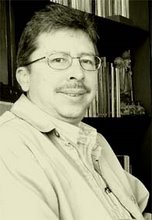Saturday, May 26, 2007
By Harold Segura
The Eucharistic celebration of yesterday, Friday, was the responsibility of Bishop Álvaro Leonel Ramazzini of San Marcos, Guatemala, who, because he was sick, delegated it on his fellow countryman Bishop Julio Cabrera, of Jalapa. Ramazzini is one more of several participants who haven’t been able to leaver their hotels due to what is now called “the virus of the Fifth”—in reference to the Fifth Conference. Cardinal Alfonso López Trujillo (Colombia), the Pope’s delegate, has been in bed for two days now; the same applies to Bishop Plácido Rodríguez of Las Cruces, United States. Other sick participants are at the Assembly, spreading their virus in an involuntary proselytism (to use church language).
I had the honor of meeting Ramazzini last year, when he was very kind to accept an invitation we made from World Vision to accompany us in an international encounter. He traveled from San Marcos to Antigua Guatemala to speak to us about social justice—but not in his theory, but in his pastoral practice that has been so broad and courageous. He has been repeatedly threatened because of his commitment to the peasants in his diocese. He organized a Pastoral Project on Land in order to advice small farmers, whom he is requesting to hold discussions with the Agricultural Chamber in order to reach equitable agreements on the issues of melon, cardamom and other products whose marketing has caused serious conflict. He has also raised his voice in favor of the people when the United States presses for the destruction of the poppy crops, the work source for the poorest. He is a threatened bishop and his people know why.
Manfred Grellert (former Vice-President of World Vision), who was in Antigua when Ramazzini visited us, said to me, “I like this guy. He speaks with the force of those bishops I thought were no longer in stock.” Manfred was referring to the generation of Leonidas Proaño in Ecuador, Samuel Ruiz in Mexico, Helder Câmara and Pedro Casaldáliga in Brazil, Gerardo Valencia Cano in Colombia, and, of course, Óscar Arnulfo Romero in El Salvador.
So when I learned that Ramazzini would be in charge of the celebration I prepared for his homily. Even though he was not present—a pity—he sent the homily, which was read by Bishop Cabrera. The scripture passage was John 21:15-19, where Jesus asks Peter three times if he loves him. He didn’t use the text to speak about Peter’s authority—he preached about the love that Jesus requires of his pastors. Love of God and love of neighbor—and the latter expressed in humility, service and fight against injustice and poverty. He spoke about the radical following of Jesus, and ended with two examples of radicalness—Archbishop Óscar Arnulfo Romero and Bishop Juan Gerardi Conedera, “whose life was Christ, and they gave their lives for him.” I wanted to applaud. (The full text of the homily can be found at http://www.celam.info/content/view/399/344/ )
Archbishop Romero was briefly with us, hand in hand with Gerardi, but not to everyone’s liking. By the way—how deep is the influence of that generation of prophets on this Conference? What is left in Aparecida of the “preferential option for the poor”? I’m not in a condition to calculate that presence. I can only perceive that it is deeper than the conservatives want, but not as much as the Continent needs. There are evident polarizations. For example, at my right hand sits a German bishop who gets excited whenever someone says “Grassroots Ecclesial Communities” (he met them in his passing by Peru when he served as a bishop there); whereas at my left sits the President of the Pontifical University of the Holy Cross, in Rome, an Argentinean priest who introduced himself to one of us on the first day as a member of Opus Dei. There are marked differences not only in the political field, but also in ethical stands, in the lines of pastoral action and in the forms of recognizing the new place of the Catholic Church in the Continent.
Of Romero and his generation, enough is left for longing and hope. There are some who are attentive to ensure that some “key issues for theology and pastoral work in Latin America and the Caribbean” will not be absent from the final document—a reading of reality as a prior step to theological development, the references to life, the presence and action of women, the centrality of the Kingdom, of the laity, of the indigenous population and the descendants of Africans. There’s also a group of almost 30 theologians and Bible scholars (Grupo Amerindia), with headquarters five blocks from the basilica, who are advising several bishops. This work they do with enthusiasm and high commitment. Today, for instance, they handed to us the first draft of the “Message to the peoples of Latin America and the Caribbean”, a four-page document that will be issued at the end of the Conference, different from the final document, and which will surely be more widely disseminated than the latter. They have given it for us to read this weekend and to discuss it on Monday. In my first reading I can recognize the influence of “progressive” people. On Monday, then, the strength of each group will be measured when the text is voted or changes are requested.
Romero was briefly with us.
Keep us, dear Archbishop, from the insensitivity of those who think that what we have to save is the Church.
Encourage those who are forging the Kingdom. There are still enough of them around.
Keep us, you who taught that “Being the Church is keeping in history, throughout the centuries, the figure of Jesus Christ.”
If possible, stay a little longer.
Harold
martes, 29 de mayo de 2007
 ARCHBISHOP ROMERO WAS BRIEFLY WITH US
ARCHBISHOP ROMERO WAS BRIEFLY WITH US
Suscribirse a:
Enviar comentarios (Atom)


No hay comentarios:
Publicar un comentario